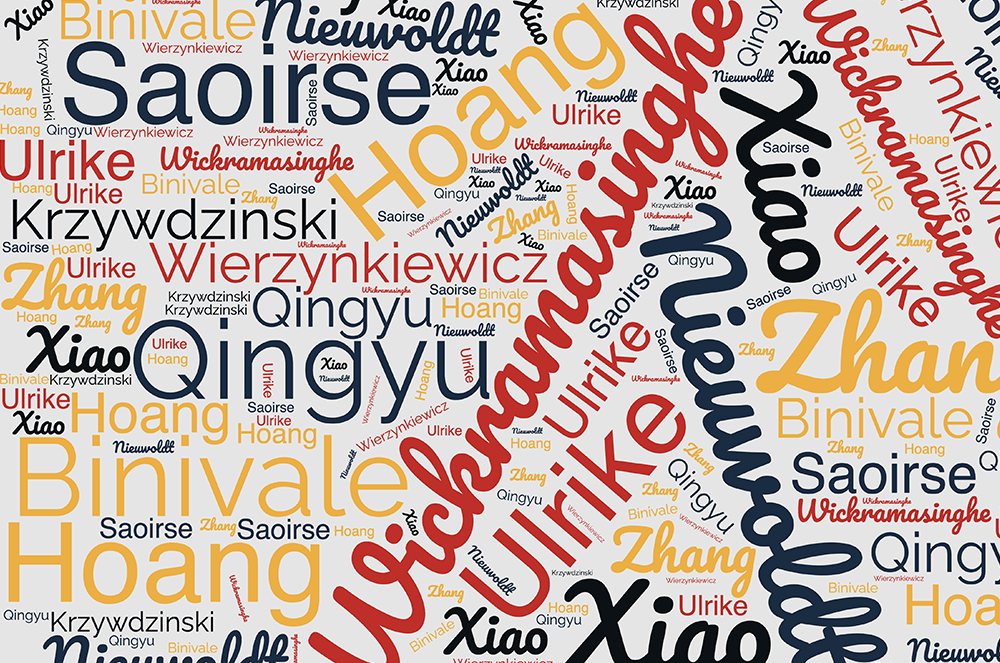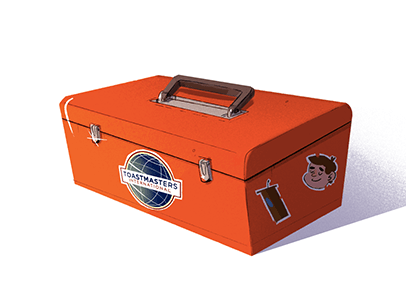
In this Toastmasters Podcast episode, cross-cultural communication expert Fiona Swee-Lin Price offers tips on how to get better at pronouncing people’s names around the world.
Imagine you’re in a Toastmasters club with members from all corners of the globe, and it’s your turn to be Toastmaster of the Day. When you receive the agenda, you pause.
The Grammarian will be Qingyu Xu, a recent immigrant from China. The Ah-Counter will be Shelomi Wickramasinghe, a Sri Lankan international student. Speakers include Gert Nieuwoldt from South Africa; Thuy Hoang, who is Vietnamese Australian; and Piotr Krzywdzinski, whose grandfather was Polish. You will need to introduce each of these members by name.
Why Pronunciation Matters
Meeting members from different countries is one of the most exciting things about Toastmasters. This diversity brings with it a challenge: pronouncing names from a wide range of languages.
When we meet someone new, one of the first things we do is exchange names. Names are part of our identity and connect us with other people. If we struggle to pronounce or remember the name of a new acquaintance, connection becomes more difficult, because it’s hard for us to greet them, talk about them, and introduce them to others.
People who move to other countries often discover their name no longer fits in the boxes on forms; often, locals mispronounce their name or address them by the wrong part. Many immigrants end up adapting their name in some way to fit in.
Alfio Magnano, a member of Williamstown Club in Williamstown, Victoria, Australia, knows the challenges well. As an Italian immigrant growing up in Australia, he often felt ashamed of his name. “People couldn’t say either of my names, and I was constantly having to correct everyone from my peers to my teachers.” He eventually shortened his name to Alf to make it easier for Australians to use.
Fellow club member Ulrike Andresen-Nikolai had a similar experience. “I wasn’t prepared for the many ‘creative’ ways of pronouncing my name. At first I tried my nickname, Uli, but now I patiently spell out my name and educate people on how to pronounce it if they ask.”
Why People Struggle With Unfamiliar Names
Over the last few years, a growing number of voices have proclaimed that we need to do better with international names. Yet they seldom provide advice on how to do better, other than asking the people for help with their names. And while this is a good start, it’s not always enough and not always possible.
For most people, hearing an unfamiliar name once or twice isn’t enough to commit it to memory (and there’s only so many times you can ask to hear it again!) This is especially true when the name includes sounds we’ve never made for certain letters before, like both the “X” and the “u” in the Chinese surname Xu.
If we struggle to pronounce or remember the name of a new acquaintance, connection becomes more difficult.
It can also be difficult to figure out how a printed name is pronounced. A name from another language might contain combinations of letters we don’t know how to navigate, like Thuy or Krzywdzinski, or have a letter pronounced in a way we don’t expect, like the “G” in Gert, which is a guttural “H” sound in Afrikaans.
In short, pronouncing multicultural names is genuinely difficult, and it’s not surprising that so many people struggle with them. So what can we do about it? I built my career around answering this question.
I grew up accustomed to hearing names from different parts of the world—my father is Anglo Australian and my mother is Malaysian Chinese. My middle name is Swee-Lin, which means “auspicious forest” in Hokkien, the Chinese dialect spoken by my mother’s family.
My bicultural background has made me ideally suited to helping people with cross-cultural communication. I advise educators on teaching international students, help service staff manage language barriers, and coach executives relocating overseas. However, the most in-demand services I offer focus on onomatology: the study of personal names. I run training programs on the structure, use, and pronunciation of culturally diverse names, and support organizations with name pronunciation at awards ceremonies.
Saying someone’s name correctly not only shows respect, but it helps meetings and ceremonies move smoothly and quickly because there are no awkward pauses while the presenter struggles, or while someone tries to determine if a mispronounced name is theirs.
I use three main strategies to help people hone their pronunciation skills: phonetic transcriptions, audio recordings, and training.
Strategies That Can Help
1 Phonetic transcriptions
How a name is spelled isn’t always a clear guide to its pronunciation. This is especially true when the name comes from a language you don’t speak. It can help to write down the pronunciation according to the rules of your native language.
For example, at a recent club speech contest, the contest chair—a native English speaker—was struggling with the name of the Vietnamese Australian Chief Judge, whose name was Thuy Hoang. I wrote “Twee Hwang” (how the name sounds in English) under her name on the agenda to help. People can use this strategy at online meetings by typing the phonetic transcription of their name in brackets on screen to help others pronounce it.
Phonetic transcriptions aren’t always easy to create. Some sounds are almost impossible to spell phonetically in another language, like the “G” in the Afrikaner name Gert. Also, it’s often difficult to write a phonetic spelling in a way that makes sense to you. For example, if you’re a native English speaker and Qingyu Xu is a native Chinese speaker, she might struggle to come up with a phonetic transcription of her name that you can understand. Your best strategy would be to listen carefully to her saying her name and write down your own spelling, or enlist the help of someone who speaks both English and Chinese fluently.
2 Audio recordings
Another method is providing someone or making someone an audio recording of the name. Sometimes I make recordings of myself reading out the names on graduation lists for the presenters to practice with.
Professor Chris Thompson from Monash University, in Melbourne, Victoria, Australia, finds these recordings immensely helpful. “As a graduation ceremony reader, the sense of responsibility is enormous and terrifying, knowing you are obliged to pronounce several hundred names perfectly, from countless linguistic and cultural backgrounds.”
For smaller gatherings, you can ask for a recording of the person saying their name, or ask if you can record them saying it with your phone.
What if you aren’t able to connect ahead of time about a pronunciation? Don’t panic: There are several options you can try. You can find out which language the name comes from and ask someone who speaks that language to help. Google Translate, while not perfect, has an audio option that allows you to hear the pronunciation. There are even websites where you can search for a word or name and receive a recording and/or phonetic transcription of its pronunciation.
3 Training
If you regularly need to pronounce a variety of names from different cultures, there are professionals in cross-cultural communication who can provide coaching, modeling, and explanations of variations in languages, as well as help you practice and refine your pronunciation.
For example, Williamstown Club, my home club, has a number of members whose names are difficult for native English speakers. I recently ran an education session where I provided background on the origins and meaning of the names of 11 members and coached everyone on how to pronounce them.
“It was impressive to hear the correct pronunciation of my full name [including my middle name],” says fellow member Kunal Narendra Binivale.
If people are struggling with the names of your colleagues or Toastmasters club members, encourage them do better. Create phonetic transcriptions and/or audio recordings of people’s names and include them when you print an agenda, meet online, or put up an online personal profile. If you have a member who’s confident and capable with international names, your club could even organize your own training session.
Most importantly, don’t sit back while people at your club fumble with someone’s name or try to avoid saying it. Find a way to provide support. Remember that one of the main goals of Toastmasters is effective communication, and that’s something that begins with a name.
Fiona Swee Lin Price, PhD is a cross-cultural communication specialist and keynote speaker based in Melbourne, Victoria, Australia. She is a member of Williamstown Club in Williamstown, Victoria, Australia. You can reach her at globalise.net.au and on LinkedIn.



 Previous
Previous

 Previous Article
Previous Article

